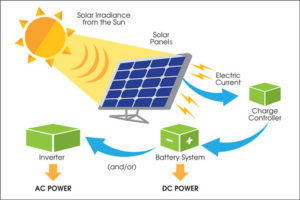Have More Questions Abour Solar Energy?
How do solar panels work for your home?
Solar panels work by absorbing sunlight with photovoltaic cells, generating direct current (DC) energy and then with the help of inverter technology, converting it to usable alternating current (AC) energy. AC energy then flows through the home’s electrical panel and is distributed throughout your home. Here are the main steps for how solar panels work for your home:
- During the day, photovoltaic cells absorb the sun’s energy and convert it to DC electricity.
- The solar inverter converts DC electricity from your solar modules to AC electricity, which is used by most home appliances.
- Electricity flows through your home, powering electronic devices.
- Excess electricity produced by solar panels is fed to the electric grid.
- At night, you will collect energy from the grid.
How much can you save with solar?
Most people can save tens of thousands of dollars on electricity costs over the lifetime of a solar panel system (25+ years). The exact amount you can save depends on many factors, including how much you spend on electricity bills, how much electricity your solar panel system generates, incentives available in your area, and more. The best way to get accurate savings estimates is to compare custom solar quotes on our Marketplace – your quotes will take all these factors and more into account.
Is solar affordable? How much does it cost to go solar?
The price of solar has fallen dramatically over the last decade (seriously – it’s dropped more than 70 percent!) In 2020, homeowners typically spend between $10,000 and $20,000 to buy a solar panel system, but it may cost you more or less depending on your state, incentives, the size of your system, the type of equipment you install, and the company you move forward with. Fortunately, you don’t need to outlay thousands upfront to go solar: like with getting a new car, there are accessible financing options for both leasing and ownership that allow you to install with no money down.
How many solar panels do I need?
Probably more than 10 and fewer than 40. We know that’s quite a range, but with solar, there’s really no one-size-fits-all solution: the number of panels you should install depends on how much sun hits your property, your energy needs, and the amount of space you have available for the installation. Most people install a system large enough to generate as much of their electricity needs as possible (that’s how you’ll save the most money!)
Do I need a solar battery?
Need? No – most people who go solar remain connected to the grid, meaning you can pull electricity from the grid when your solar panels aren’t producing enough to meet your needs. However, even though you don’t need one, solar batteries have some pretty great benefits: if you live in an area that experiences frequent power outages, a battery will help keep your solar-powered home running when the grid goes down. Also, if your utility company has demand charges or time-of-use rates, installing a solar battery can help you save money.
Get the best solar system deals and offers in your area today.
A Few Reasons To Go Solar
Solar is affordable!
If you can afford to pay your electricity bill every month, you can afford to install a solar panel system. With a $0-down solar loan or solar lease, you can finance your system and see immediate savings. You also have the option to purchase the system outright.
Installing solar is a great investment.
Investing in a solar panel system can deliver better returns than stocks and bonds – and now is the right time to make that investment. While solar photovoltaic technology is improving incrementally each year, financial incentives and rebates will decrease as solar becomes more popular.
Solar panel systems are highly durable.
Solar photovoltaic panels are made of tempered glass and can withstand hail, snow, rain, and high winds. They can even extend the life of your roof by protecting it from daily wear and tear.
Solar provides energy independence
With the right planning, your solar panels can generate enough electricity to meet your needs over a 12-month period. As long as you have enough roof space to install the right size solar panel system, the power that your panels will produce will effectively eliminate most of your electricity bill.
How to Eliminate Your Electric Bill
Eliminate or significantly reduce your electric bill with solar energy
One of the biggest reasons to go solar is that you can eliminate or significantly reduce your electric bill. An average monthly electric bill of $100 becomes an annual $1,200 expense. Over 20 years, that same $100 monthly bill balloons to $24,000 paid to your utility, and that’s before factoring in electricity rate increases that will likely make your 20-year energy costs even higher. Installing a solar panel system at your home or business takes you out of this cycle.
Going solar can eliminate your electric bill completely or reduce it so dramatically that electricity costs are no longer a significant factor in your budget. Your savings with solar depend on a few different factors, like how much energy your system produces and how much you consume, but the biggest factor is the rates you would otherwise pay to your utility.
Take advantage of the tax incentives TODAY!
Incentives
Federal Tax Credit
22%
Until December 31, 2021, the federal government is granting a credit for homeowners who switch to solar.
State Solar Rebate
26%
The 26% tax credit applies as long as the solar energy system is installed by December 31, 2022. Starting in 2023, the value of the tax credit will step down to 22%. After 2023, the tax credit for residential solar ends.
Property Value
15%
The average homeowner who invests in solar energy gains up to 15% on their home value






